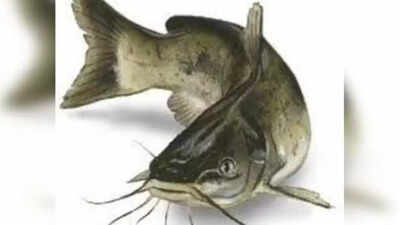For communities reliant on fish as a dietary cornerstone, especially when paired with rice in coastal and riverine areas, making informed choices about safe and sustainable fish is paramount. While many fish varieties offer nutritional benefits without risk, the Thai Mangur Fish, also known as Thai Catfish, has triggered significant health and environmental concerns.

Despite a government ban implemented in 2000, the illegal farming and sale of Thai Mangur persists across India, posing a serious threat to public health. This prohibition stems from the fish's detrimental health impacts and ecological damage, contributing to a staggering 70% decrease in native fish populations and inflicting severe harm on India's aquatic ecosystems.
The Thai Mangur is a hybrid catfish species, initially cultivated for its rapid growth rate and adaptability. As a non-native species introduced from outside India, this carnivorous fish poses a threat to indigenous fish populations, significantly disrupting aquatic habitats.
While its popularity surged due to its fast growth and ease of farming, the Thai Mangur quickly emerged as a public health hazard and ecological menace. Consequently, its farming, sale, and consumption are now legally prohibited in India.
According to News 18, the Indian government and various regulatory bodies have outlawed the Thai Mangur due to its detrimental health effects and environmental hazards.
The National Green Tribunal (NGT) initially banned its cultivation in 2000, highlighting the fish's carnivorous nature and its potential to disrupt aquatic ecosystems. Experts in fisheries health and safety emphasize that the cultivation, sale, and consumption of Thai Mangur fish are not only illegal but also pose extreme risks to human health. Violators face strict legal consequences under national laws.
Dr. Priyanka Arya, Assistant Director of the Aligarh Fisheries Department, cautions that consuming Thai Mangur fish may elevate the risk of cancer. The fish are often raised in unsanitary conditions and fed rotten meat mixed with spinach, practices that contribute to severe water pollution and pose a direct threat to consumers. The fish has been linked to carcinogenic effects, making it one of the most harmful fish banned in India.
Beyond individual health concerns, the Thai Mangur fish has inflicted substantial damage on India's aquatic ecosystems. Research indicates that this invasive species is responsible for a 70% decline in native fish species in India. Its aggressive, carnivorous feeding habits lead it to prey on smaller native fish, disrupting the ecological balance in rivers, lakes, and ponds.
Furthermore, Thai Mangur often carries parasites such as fish lice, which can trigger epizootic outbreaks, leading to widespread disease and decimating entire fish populations in aquaculture environments.
One of the primary dangers associated with Thai Mangur stems from unsustainable and unhygienic farming practices. Some fish farmers maximize profits by feeding these fish rotting meat waste, often combined with leftover vegetables like spinach. This practice not only contaminates the fish but also pollutes surrounding water bodies, accelerating the destruction of aquatic ecosystems.
The ban on Thai Mangur is not merely advisory; it is strictly enforced. The government has made it clear that anyone involved in the cultivation, distribution, or consumption of Thai Mangur will face legal penalties. Public agencies, including the Fisheries Department, have been instructed to conduct raids and take legal action against violators.
The Fisheries Department has launched multiple awareness campaigns to educate the public about the dangers of eating Thai Mangur, specifically emphasizing its carcinogenic properties and harmful rearing practices.
Newer articles
Older articles
 Suryakumar Yadav Sidelines After Sports Hernia Surgery: Understanding the Injury, Recovery, and Treatment Options
Suryakumar Yadav Sidelines After Sports Hernia Surgery: Understanding the Injury, Recovery, and Treatment Options
 Popular Finance YouTuber's Account Hacked, Bitcoin Scam Promoted: Security Lessons Learned
Popular Finance YouTuber's Account Hacked, Bitcoin Scam Promoted: Security Lessons Learned
 Jadeja's Test Performance Criticized: Ex-India Pacer Aaron Slams Inconsistent Bowling in England Loss
Jadeja's Test Performance Criticized: Ex-India Pacer Aaron Slams Inconsistent Bowling in England Loss
 Hollywood's Love Affair with India: Iconic Film Locations Revealed
Hollywood's Love Affair with India: Iconic Film Locations Revealed
 Ashada Gupt Navratri 2025: Unveiling Dates, Timings, Significance & Secret Rituals
Ashada Gupt Navratri 2025: Unveiling Dates, Timings, Significance & Secret Rituals
 Rishabh Pant's Triumphant Return: LSG Owner Sanjiv Goenka Hails Star's Record-Breaking Performance After Near-Fatal Accident
Rishabh Pant's Triumphant Return: LSG Owner Sanjiv Goenka Hails Star's Record-Breaking Performance After Near-Fatal Accident
 Microsoft Aims for Foldable Redemption with Novel Hinge Design to Rival iPhone and Android
Microsoft Aims for Foldable Redemption with Novel Hinge Design to Rival iPhone and Android
 Shubman Gill's Captaincy Under Fire: Bold Calls Needed After England Test Defeat
Shubman Gill's Captaincy Under Fire: Bold Calls Needed After England Test Defeat
 India vs. England: Team Preps for Second Test as Bumrah's Absence Raises Workload Management Questions
India vs. England: Team Preps for Second Test as Bumrah's Absence Raises Workload Management Questions
 6 Yoga Poses to Naturally Support Thyroid Function and Hormonal Balance
6 Yoga Poses to Naturally Support Thyroid Function and Hormonal Balance